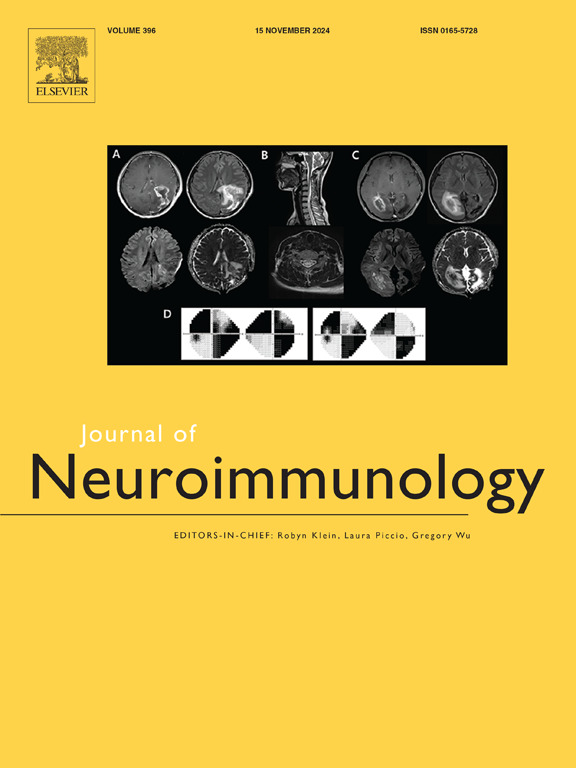Pure spinal multiple sclerosis: A case series of a possible new entity
IF 2.9
4区 医学
Q3 IMMUNOLOGY
引用次数: 0
Abstract
Background
Recent literature describes a condition similar to multiple sclerosis (MS) but with demyelinating lesions limited to the spinal cord. This condition, referred to as “pure spinal” MS, might benefit from disease-modifying treatment (DMT).
Methods
We screened the medical records of approximately 8000 patients with demyelinating diseases at the Isfahan MS clinic in Iran. Criteria for inclusion in the case series were adults with a demyelinating disease limited to the spinal cord, positive oligoclonal IgG bands in cerebrospinal fluid (CSF), and negative results for other potential diagnoses.
Results
Seven people with pure spinal MS were identified (all women, mean age [SD]: 40.14 [6.17] years at the first visit, mean follow-up duration [SD]: 98 [39.41] months). Two had a family history of conventional MS in their siblings. All patients exhibited lower limb weakness and tested negative for anti-MOG and anti-AQP4 antibodies. They experienced relapsing-remitting partial myelitis, with new spinal cord lesions on MRI but no extraspinal CNS lesions. DMT significantly reduced relapse rates in all patients, and two showed no increase in EDSS scores.
Conclusion
Pure spinal MS might be an atypical form of MS. Those affected may benefit from DMT; therefore, further investigation and consideration in the upcoming revisions of the McDonald criteria are recommended.
临时切除:纯脊髓型多发性硬化症:一个可能的新病例系列。
背景:最近的文献描述了一种与多发性硬化症(MS)相似的病症,但其脱髓鞘病变仅限于脊髓。这种情况被称为 "纯脊髓 "多发性硬化症,可能会受益于疾病改变治疗(DMT):我们筛选了伊朗伊斯法罕多发性硬化症诊所约 8000 名脱髓鞘疾病患者的病历。纳入病例系列的标准是患有局限于脊髓的脱髓鞘疾病、脑脊液(CSF)中寡克隆 IgG 带阳性且其他潜在诊断结果为阴性的成人患者:结果:共发现七名纯脊髓型多发性硬化症患者(均为女性,平均年龄[SD]:40.14 [6.17]:首次就诊时平均年龄为 40.14 [6.17] 岁,平均随访时间 [SD] 为 98 [39.41] 个月)。其中两人的兄弟姐妹有传统多发性硬化症家族史。所有患者均表现为下肢无力,抗MOG和抗AQP4抗体检测均为阴性。他们都经历过复发-缓解型部分脊髓炎,核磁共振检查有新的脊髓病变,但没有脊髓外中枢神经系统病变。DMT明显降低了所有患者的复发率,其中两名患者的EDSS评分没有增加:结论:纯脊髓型多发性硬化症可能是多发性硬化症的一种非典型形式。结论:纯脊髓型多发性硬化症可能是一种非典型多发性硬化症,患者可能会从 DMT 中获益;因此,建议进一步调查,并在即将修订的麦克唐纳标准中加以考虑。
本文章由计算机程序翻译,如有差异,请以英文原文为准。
求助全文
约1分钟内获得全文
求助全文
来源期刊

Journal of neuroimmunology
医学-免疫学
CiteScore
6.10
自引率
3.00%
发文量
154
审稿时长
37 days
期刊介绍:
The Journal of Neuroimmunology affords a forum for the publication of works applying immunologic methodology to the furtherance of the neurological sciences. Studies on all branches of the neurosciences, particularly fundamental and applied neurobiology, neurology, neuropathology, neurochemistry, neurovirology, neuroendocrinology, neuromuscular research, neuropharmacology and psychology, which involve either immunologic methodology (e.g. immunocytochemistry) or fundamental immunology (e.g. antibody and lymphocyte assays), are considered for publication.
 求助内容:
求助内容: 应助结果提醒方式:
应助结果提醒方式:


